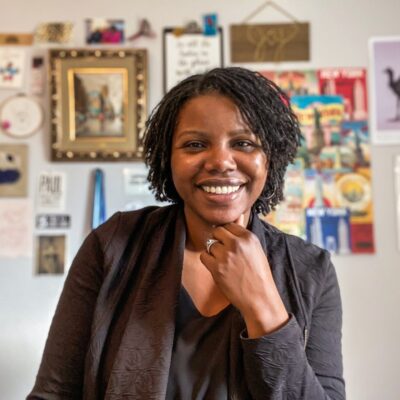In March 2020, one week before the Coronavirus pandemic shutdown, Jenny Menges was on a press trip in London. She was there with the New York Wine & Grape Foundation, representing Hermann J. Wiemer Vineyard, where she’s the Director of Operations. “No job is perfect,” she smiles, “but this one is pretty close.” For Jenny and the rest of the team, working at Wiemer is more than a job. It’s more like an extended family, and she was eager to get home to it.
Hermann J. Wiemer Vineyard sits in a 90 year old scissor-trussed barn at the end of a winding gravel road lined with Locust trees. Prior to the pandemic, a smiling face would greet you at the entrance of the tasting room, usually Jenny’s. You might meet Rufus, the rescue cat who lives in the office, always looking for a scratch behind the ear. On warm summer afternoons, you might catch a glimpse of the co-owner’s children with shy smiles by the door, laughing as they run from the press pad to the retail shop.
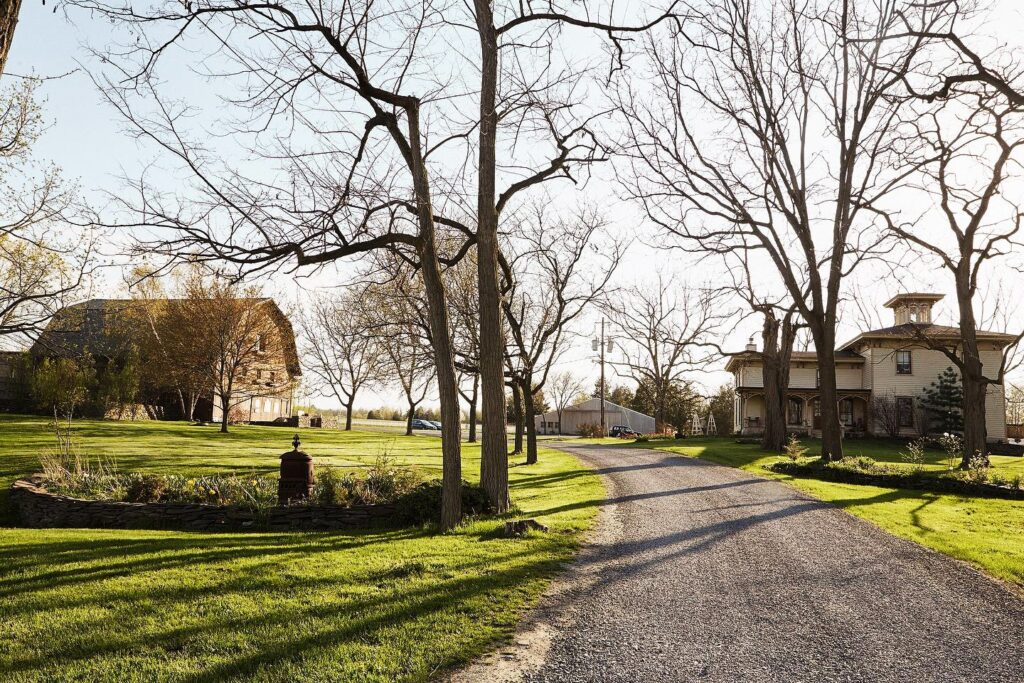
The barn is situated on HJW Vineyard, 33 acres of land selected and planted by Hermann Wiemer himself to test his theory that Vitis vinifera could thrive on Seneca Lake. Hermann emigrated to the Finger Lakes from Germany in the 1960s and was sure the region’s cool climate and gravelly soils were similar enough to the family vineyards he’d grown up around in the Mosel. The Riesling and Chardonnay vines he planted in 1976 led to Hermann winning Gold in New York competitions with his first vintages. 45 years later, those vines are still producing the award winning wines served in the tasting room and shipped nationwide.
2007 ushered in a new generation with Hermann’s retirement. Long-term apprentice and winemaker, Fred Merwarth took over in partnership with his university friend, Oskar Bynke. The two, with Fred’s wife and business partner, Maressa, have worked hard to carry on Hermann’s legacy as an industry leader–and they’ve succeeded. Hermann J. Wiemer Vineyard has been in the list of Top 100 Estates by Wine & Spirits magazine for 10 years running. They are the only New York State vintner on the 2020 list and in great company with heavy hitters like Dr. Loosen, Penfolds and Ridge Vineyards. Their most recent acquisition of Standing Stone Vineyards added 46 acres and a tasting room on Seneca’s east side, just a part of over 100 acres of land owned and maintained by the team at Wiemer.
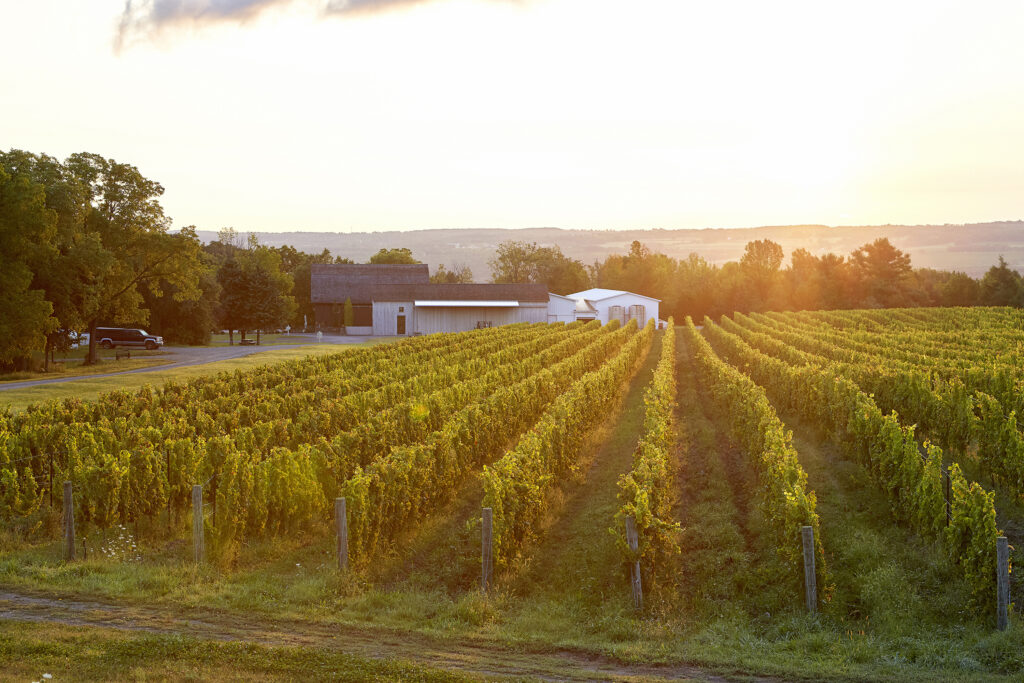
It seems 2020 was due to be a big year for the brand, and a worldwide pandemic was not part of the plan. Shortly before the travel bans went into effect, Jenny landed back in Upstate New York and went immediately into quarantine. On March 16th, the Governor issued an executive order halting on-premises consumption and the winery was closed until further notice. Of their 54 employees, half were impacted by the shutdown. “I came home with a lot of uncertainty, and quite frankly fear.” Jenny recounts, “This winery is a part of my identity and not knowing if we would be able to reopen was just very scary.”
A Pandemic Pivot
Faced with a real-time need to change the design of their business, Jenny joined a taskforce that included Fred, Oskar and Maressa. The team spent their days layering ideas on top of ideas, all of which continued to change and evolve as new rulings came down from the state around operating procedures and safety protocols. The one element that stayed consistent was a commitment to a new tasting room experience centered in their core pillars of education, hospitality, and community.
Community has always been at the center of Wiemer’s business model. Outside of the awards and accolades from wine critics, publications, and influencers, the team is most proud of the relationships they’ve fostered and maintained over the years. “Yes, these people are our customers,” Jenny says, “but many of them have become more like friends, some even like family. This was about more than just getting the doors back open.”
So the team got to work. They pulled inspiration from lived experiences—a special dinner at the New York City’s famed Eleven Madison Park and a treasured wine tasting experience in Sonoma. Both were highly curated and personal moments that were also physically separate from other guests. Food and wines stunningly presented by knowledgeable staff with good timing and intuition, offering helpful explanations without becoming intrusive. Some extra space to cuddle with your partner because it was your anniversary, or a birthday, made the experience unforgettable. It was running through these moments as a team that made Jenny realize Wiemer could turn the tasting experience into a memory. “Ultimately, it came down to wanting our guests to not only feel safe, but to say: “Wow, we got out of the house and it was wonderful in so many ways.”
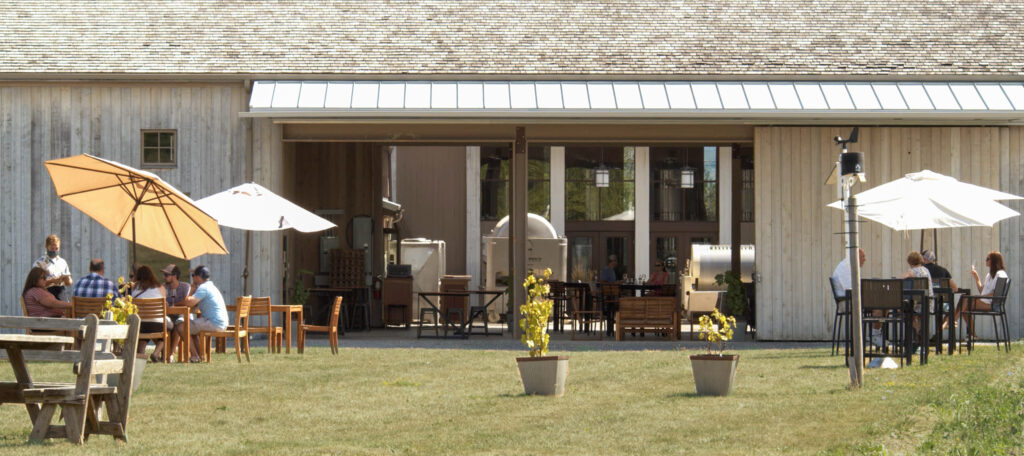
A new tasting experience
On June 6th, the winery reopened to guests by reservation only. “We knew that if it had to be seated [by state mandate] then it had to be beautiful. It couldn’t just be a socially distant version of bellying up to the bar. We were focused on making heightened safety feel normal.” The team rented tents, purchased and built furniture, and stocked up on cleaning supplies and PPE. They decided to utilize new areas, like the press pad, typically used for hand sorting grapes and storing equipment between harvests. They worked with tasting room staff on how to smile more with their eyes, and not to hover or yell through their masks. And they switched from a predetermined tasting menu to a new model where guests could select from the full catalog of available wines, priced individually by the 2.5oz pour.
While Wiemer was thrilled to open doors again, the team was worried. “I think we were all a little afraid,” Jenny confessed. “You put so much time and effort into changing your business […] The human side of us was worried people would be mad that things weren’t the way they used to be and we just hoped our guests would forgive us later.” As it turns out, by enhancing the experience and adding Covid-friendly guardrails, they allowed both guests and the staff to relax.
Customers loved it so much that four weeks in, they were overwhelmed with reservations and needed to seek out an online booking system. The silver lining of yet another logistical change was that the reservation system provided feedback in real-time with an automatic call to action for a post-visit survey. “We heard repeatedly that guests loved the seated tasting, loved being able to hang out with a small group of friends or bring their dog and be largely undisturbed.” While most reviews provided positive reinforcement that their decisions were right for their audience, Wiemer also used the feedback for real-time enhancements to their next day. For Jenny, the constant evolution of the experience was not only inevitable but welcome.
Ultimately, these changes led to a higher quality customer experience. “In hindsight, we were probably losing valuable time with our guests to keep up with flow before. It started to feel like we might have been going through the motions of our day-to-day a little bit.” With guests empowered to select their own flight of wines, a rehearsed script for staff no longer fit the bill. And as the team got more comfortable with the consistency of change, they started having fun. They were suddenly serving wines that weren’t typically poured, like the biodynamic Riesling or the Noble Select late harvest offerings. Because of this, Jenny increased training opportunities to empower staff to be even stronger stewards of the brand. “Not only are we encouraging staff to taste the wines on a more regular basis because there are more bottles open, but we’re teaching them about biodynamic farming or the process of making botrytized wine and they love it. They are so much more confident in our entire portfolio than they’ve ever been before and that feels really good.”
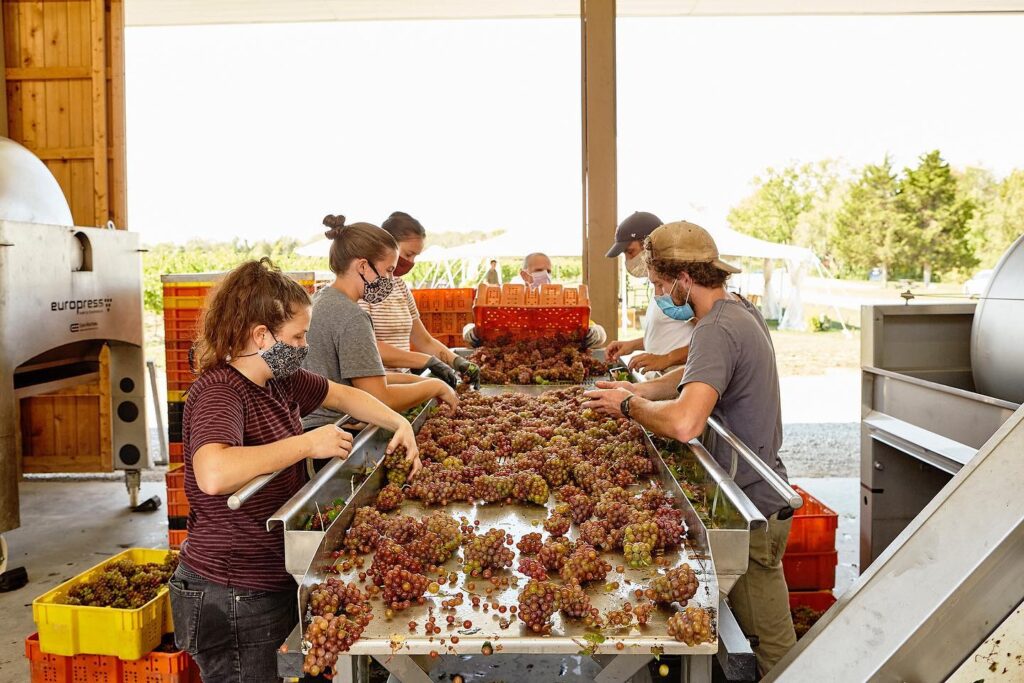
Unique challenges offer unique opportunities
Of course, the changes weren’t without their challenges, especially as summer turned to fall in Upstate New York. “We did a lot of adjusting and figuring things out and every time we got comfortable in a plan, the weather would shift and we’d need to rethink and reset again.” When not constantly adjusting for weather, the team was anxiously awaiting harvest because “regardless of a pandemic, nature keeps going.”
As the season progressed, the vineyard management team started tasting grapes weekly, and then daily. After a few false starts, and one too many furniture moves, the Wiemer team decided their only option was to incorporate their guests into harvest. “Initially, we felt bad about it,” Jenny remembered. “We joked a lot with people as we sat them outside, saying we were so sorry, and that it might be a little loud. That there might be a forklift that goes by because we’re bringing fruit down from the Josef or Magdalena Vineyards today. But instead of people being worried about dust, noise, or heavy machinery, they were excited at the chance to see the process.”
And this proximity to the land and the harvest experience became even more important as Jenny realized that the Wiemer audience was changing. “I can’t tell you how many people I met vacationing in their home state for the first time this year, and who were surprised to learn how beautiful it is. So, sure there were a lot of unique challenges, but they also presented unique opportunities for guests to be closer to the winemaking process than ever before.”
The team at Wiemer isn’t sure what 2021 holds but they are looking forward to all of it. So far, Jenny has plans to bring back Facebook Live tastings featuring Oskar & Fred, who have a cult following online for their fun and pithy style. They’ll also begin providing personal tastings on Zoom again, hosted by a recent addition to the team, Sommelier Thera Clark, who joined Wiemer after a career in New York City’s high end restaurant scene. Jenny is hopeful that live events will come back as well, safety permitting, as they are a massive part of Wiemer’s ethos and the team is eager to get back to them.
With overwhelmingly positive feedback from customers, it’s highly unlikely that the team will return to the previous tasting model. Their focus right now is enhancing the new design even further and Jenny is clearly excited. The taskforce is currently thinking about the once-a-year visitor who may have finally worked up the courage for a visit, one year into the pandemic. She trails off after detailing a few thoughts and smiles, “We have lots of ideas.”

